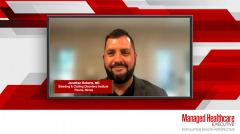Navigating Challenges When Switching Therapies in Hemophilia A
Recognizing the significance of patient comfort, familiarity with treatment, and established support networks is crucial for adherence if treatment switches are needed.
Kimberly Epps, PharmD, CSP: Challenges of switching [and] nonmedical switching enforced by the payer from an infusion medication to a subcutaneous medication like emicizumab would bring about a lot of issues that I don’t think we would have considered prior to this therapy becoming available. So just because I handled a large number of patients that have undergone a switch from factor VIII infusion therapy to subcutaneous emicizumab, there have been patients that have switched back simply out of lack of comfort. So [what] they’re used to if they get that tingle and they know their signs of bleeding, and that infusion is their safety blanket. They know they can infuse. They know how quickly they respond to their factor [and] they know what to expect. With emicizumab, there are no corresponding factor VIII levels. So you’re going on the idea that this is just going to work. It’s not an answer to a bleed. So a lot of patients are feeling that tingle thinking they have a bleed and maybe not getting it confirmed, and also using infused factor VIII products to address that concern. We have seen patients that have just ultimately switched back because they weren’t infusing more medication on emicizumab. As backward as it sounds, this is how the community has grown up. As you get into the younger children, those that as of 6 months old have probably been on emicizumab. This is what they’re comfortable with, and they haven’t known infusion. You might get a little bit less of that. But right now, the majority of patients that I deal with they’ve been on infusion their entire life. They’re going into adulthood, and they know their body better than anyone. So it’s a little bit disconcerting for them to not have factor VIII to infuse and not have any kind of benchmark to say, “Well, I injected my emicizumab last Friday, but I’m feeling that tingle this Wednesday. What do I do?”
For limited distribution products, or if a product were to only be available at certain pharmacies, the problem is, the hemophilia community is a very tight community. They depend on their groups, their foundations, their educators, and the manufacturers and they get really close to these people. So some of those people are at the specialty pharmacy and if they’re mandated to change the person that they call to say, “Hey, I’ve had a bleed and I need another dose,” that’s a discomfort for them. That risks noncompliance because they’re not going to have that comfort level. They’re not going to reach out when they have questions because this has been their person. A lot of the community members depend on each other to be their support system and to take care of their factor needs. Again, it would be more of a compliance issue, or more compliance and adherence, because patients would want to be with the person they were comfortable with and share that information with their preferred specialty pharmacy.
Transcript edited for clarity.
Newsletter
Get the latest industry news, event updates, and more from Managed healthcare Executive.























